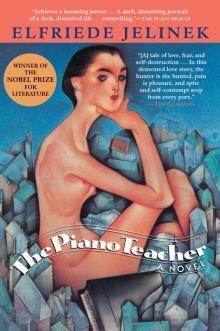- Home
- Elfriede Jelinek
Wonderful Wonderful Times Page 11
Wonderful Wonderful Times Read online
Page 11
Out in the cool bright sunshine, which they will soon quit for the darkness of an unhealthy room, Hans wilfully kicks paper and other litter, tricking and dribbling past one or several players on the opposite team. Anna tries to waft along in a lively, supple way but the effect is tired, stiff and clumsy. Light is not Anna's domain, nor is Nature. Anna's domain is artificiality. Where she blossoms. But here there is only the light of Spring, dust, exhaust fumes and the Viennese air.
Hans discourses on Sophie's complexion, which is always healthily tanned, you can see she gets a lot of exercise in the fresh air. The wind and the sun have created that complexion. It is pure, and so is her blonde hair, which is silky, yours is often so greasy and straggly and drags on that thin bony trestle which you can hardly tell is meant to be shoulders. A clothed coat-hanger. But nevertheless kind of attractive. The very thing for a man with sporting talents who is about to discover his mental abilities. Don't you want to learn to play tennis too? You're sensuous enough to acquire a special feel for the ball. No, I'd rather practise the Berg sonata, which is a challenge for a young pianist. You'd be better off bergclimbing than bergsonating, ha ha. So you don't become too much of a smart-alick berk.
Thank God, the old folk are not at home. You have to be grateful for small mercies. Anna unbuttons Hans's shirt to see what is under it. Nothing new. The usual: a muscular, unhairy chest with beautiful, smooth skin, which you can get stuck into nicely. You can't wait today, baby, fine by me. Anna sinks her sharp vampire teeth into various parts of Hans. Ouch, says the latter, my lunchbreak's only short so let's forget the foreplay, you told me that's what it's called, let's shove it in straight away. It'll all be over soon. If he were with Sophie, he'd be in a flowery hay-scented meadow or on a warm beach beside a warm sea or in a ski hut covered with fleeces and fells, but as it is he's only beside Anna in a flat in an old building. Sophie is blonde, Anna is dark brunette, one-nil to Sophie. And that will be the final score too, one-nil to Sophie.
I want you so much, I want you so much, I like what you're doing, whispers Anna. You like that, don't you, Anni, hisses Hans between clenched teeth, oh and by the way, I'm about to come, you know, the readiness is all, I'm coming right now. Here I am!
Anna howls and coughs because she is having trouble getting her breath, Love has grabbed hold of her with terrible violence, Love always does that, it's a bad habit but Love can't kick it, it comes whether you want to or not. Anna doesn't want to but unfortunately she has to.
Anna points out to Hans that he won't find another woman with as broad a theoretical knowledge as her own in a hurry, there aren't so many like her anywhere and in Hans's circumscribed circle of acquaintances they must be even fewer and further between. No other woman would understand what she felt with you, but I understand it, that is my advantage, and that's is why I require gentle treatment, my sensibility suffers worse because of the world's wickedness than other women's. Love me, Hans, you will, won't you, please. A woman like me doesn't often ask for things but when she does you have to give her what she wants because it means she has swallowed her pride.
I'm not tensed with anticipation any more and I have to get back to my place of work before they notice my absence.
Anna kisses Hans heartily. This makes a pretty loud smacking sound, which embarrasses Hans. He moves away from Anna and pulls on his work trousers and checked shirt. On the table are the second cheese sandwich and the bottle of beer you need to restore your energy. On the bed, the woman who will build you up even more. You have to love a man a lot if you'll let him eat a cheese sandwich beforehand. Anna loves Hans so much that she did not even notice the first cheese sandwich, just as a mother no longer notices her infant's shit.
Hans says he does not believe that that was Love, because Love is still ahead of him and looks more like Sophie and is Sophie. Long after his echoes have died away in the stairwell, Anna is still looking after him like a cow looking after an express train. She knows that Love looks like Hans, which is by no means an unattractive proposition but is still decidedly disagreeable. Because he has not realised what a gem she is and that she is the best woman he'll find, really she's too good for him in fact. Alas, he is in pursuit of faraway happiness, yet in reality happiness is so close. As close as the Good Things in Life are. But he must needs go a-roaming far away. Which is disagreeable for her. Though not for him.
SHAKEN BY THE wind, various trees tremble against the night sky. It looks as if they were being shaken by invisible iron clamps, but this scene of seeming disorder, which is in reality orderly, was created by a gardener, who put the trees together that way on purpose. They are creaking and squealing as if they were really for it now, but no one is doing anything to them, except the wind. After all, Sophie's garden affords them total protection from wanton damage by strangers. The impression they make is one of unconstraint and artistry, and that is precisely the impression Rainer wants to make too, crouched at the foot of a tree selected at random, maltreating the German language (as the German teacher puts it), though really his essays are of an unconventional type, slapping the rules in the face. Apart from his sister, the only person who understands this is Sophie, and no one else. He beats savagely at a blue spruce, repeatedly, because he cannot think of a certain word, it's on the tip of his tongue but it just won't come to him, but then, just as he's hitting the innocent spruce for the fifth time, suddenly there it is, the word is Death, of course, and it enfolds him in its gloom. He is forever having to think about death. He makes the appropriate face. In French, Death is a woman and appears in Cocteau; in German, Death is a man and appears in his own work. A poem is in the course of composition. Composition is a tormenting business and frequently goes unfinished because the poet gives up, discouraged. He has precious little patience for the business, because the making of a poem involves torment and unfortunately takes time, which the artist generally does not have because after all he has more to create than simply the one poem and has to be constantly roaring on ahead. Sophie does not roar like the wind, she glides like the blade of an ice-skate across a mirror of ice. This ground is her own ground, her own territory, and she needs no particular grounds to walk there, the ground is covered with an English-style lawn and sprinkled with pedigree flowers and water from a sprinkler. A white mirage materialises out of nothing and turns out to be she herself and (Rainer hopes) will not return to that nothing in too much of a hurry because he needs her for inspiration. He is stuck at the part where Death places the sailor's cap on the face of the dead child in the pond. This is reminiscent of Trakl, though only slightly. He tries being brutal, to conceal the tenderness he feels towards her, and orders her to sit down on her own lawn. This is something that she would normally say to him, usually the person who extends the invitation is the owner. But she sits down nonetheless.
A party is going on in the house, guests in gossamer dresses and brocade dresses and dinner suits making conversation. They are managerial people and they manage a great deal, as the word implies. Occasionally they can take a joke. What they manage is golf, or riding in the Krieau. The feeble sounds of a foxtrot can just about be made out, the women's pastel patches of colour glide to and fro to the music. Sometimes they flit, sometimes they shove and scoop like excavators and thrust everything aside, servants with trays flee for safety; if the servants are honest and hardworking their positions in this household will be permanent and secure. The dresses are wonderful and looking on is a treat, even if only from a distance, which is where Rainer is at present, he says he wouldn't go inside if you paid him, because if you're outside you have a better grasp of social structures, since you can see more of the overall picture. Structures of this kind have no place in literature, however, because they already exist and do not need to be invented, which is the exclusive task of poetry. The patches of colour lapped by the heads of their wearers surface like vast patches of colour (that is all they can be perceived as) from some crystal depth, jewellery glittering like the foam on waves. Rainer looks on, g
aping, from his position, not of course in the street but in the grounds. Even that position is relatively unnatural, because this person is mostly to be found in interiors, carefully screened from the street and what goes on there. What Rainer's interested in is the raffish style of that girl's room of Sophie's, not the riff-raff in the streets. When I say girl I mean girl, because you are not a woman yet, Sophie, but it will be unbelievably more marvellous once you finally are one, once I've made you one. It will be an explosion, but without any of the fouling that usually goes on among human beings, alas, if the man is a jerk and the woman none too beautiful.
It has never occurred to Sophie that you can do anything else with bodies but sport, the thought has never entered her head, never struck her. There may be something apart from what I'm familiar with, something different, but what could it be? I can't for the life of me find out what it is, but it can't be necessary since I don't miss it, don't feel I'm going without something, so it won't be done, either. Although she often does do what is unnecessary. She has framed photos hung on the walls of her room: Sophie aged three, aged four, wearing beautiful tasteful dresses, on a private estate or outside one of those giant showcase hotels in St Moritz. The effect is terrifically aesthetic and she likes looking at those pictures since they emanate a certain harmony she has somehow lost, she doesn't know where, but she isn't looking for it because recently she has felt a slight need for dirt, which is the very opposite. Dirt in a grand style. Because everything Sophie does is stylish. Nothing by halves. Little piggy Rainer, by contrast, merely turns out paltry rubbish, which he then even proceeds to destroy by talking about it incessantly till every last scrap of muck has been transformed into gold, whereupon it can be slung out, garbage. Once it's gold it's no use to anyone. Why not wallow up to the hilt and deliberately forgo the transformation into literature? It is enough if you yourself know it's shit, does everyone else have to know too? Perhaps the act of describing muck means more to Rainer than the muck itself? How squalid.
Sophie's mother materialises, from out of a huge inherited fortune, in front of the huge iron gateway. Sophie's mother arises from out of the ground like a candle flame suddenly lighted, a crowd of people immediately fall upon her, scratching with their feeble claws at the portals of her capital, but they are given no reply, this crowd, and have to slink off with nothing accomplished. But she doesn't simply do nothing whatsoever, this mother, as you might expect, she is also a first-rate scientist and extremely beautiful, she gets her fulfilment out of the things she does, some people do more and others do less, she emphatically does more. Merely being at home isn't enough, you have to be a scientist too. It is like a picture by Klimt being pulled along by an express train, out of the darkness into the light. Her pale blue silhouette is by no means conceived as a memorial to all those who kicked the bucket in her very own steelworks in the Nazi period, it is intended as a beautiful sight for unprejudiced eyes; even if you have reservations, you still have to recognise beauty as such when you come across it, irrespective of the person. She tells Sophie to go indoors so that she does not catch cold, in any case some guests want to see her. Your friend can help himself to some of the homemade raspberry ice cream in the kitchen, it doesn't matter if he stuffs himself, there's plenty. You can't buy my love, Mama. Promptly Mummy goes indoors, hissing, flings herself on the bed and succumbs to a fit of hysterics, screaming like an animal in its death throes, sundry people are unable to calm her down and a professor of medicine who is present accordingly gives her a sedative. She couldn't care less about her guests, she'll kill herself here and now if her one and only daughter doesn't love her. Her husband is spat at and thrown out when he asks how she is, he comes from a relatively poor family and took a course in mechanical engineering, which involved his parents making considerable sacrifices. But those sacrifices have been forgotten, so have the parents, only the sobbing wife is still there.
Sophie drops a curtsy and swirls her white tulle frock like a peacock's tail. The tulle crackles softly, like burning wood shavings. In the slightest of breezes it lifts a little, because it offers the breeze quite a purchase, which is something Sophie never does at other times. When the material rises, Sophie's slender legs are revealed in wispy stockings, which appear all the more expensive once you pause to reflect how easily they ladder. To be thinking of how long things last when confronted with this pearly sheen is pure perversion, and Rainer makes a great effort not to think the thought, he's quite sufficiently occupied in thinking how short-lived his poetry is. This occasions him little pleasure, since many generations to come are supposed to read these poems attentively. But perhaps they never will. Because they will be unacquainted with the poems. Thoughtfully (let's hope that at least Sophie is thinking of those poems, but no, plainly she isn't) Sophie picks a tiny pointed twig up from the floor and rips a hole in the nylon with it, she widens the hole and zap, away the ladders run, these stockings are so fine that you very nearly can't see it but you know that where there was nylon previously there is now nothing, it's been ruined. It's disintegrating. Her hair has that gloss because of the one hundred brush-strokes. These are as important in caring for it as butter is on bread, always supposing you don't have to use margarine in private. Sophie has totally wrecked her right stocking, can I get in first and beg a pair for Anna, thinks Rainer, if she's doing wanton and irreparable damage, better not, whatever you do don't ask for things. I'm going in again now; after all, Mama's out of action for the rest of the evening yet again. If they want to hear one of my poems (Sophie writes them too, though without much enthusiasm) I shall read them some dirty passage of de Sade or Bataille in French, it won't shock them but it will amuse them. Not like Schwarzenfels recently, who blasted off at the people he was playing with at the Club, in a really common way, and broke a lot of glasses. He leapt onto the table in full uniform so everything clattered and crashed. People put up with it, though it was poor style, Schwarzenfels is an enfant terrible and there's nothing to be done about it. He gets drunk and becomes abusive. Simple-minded. He's a pig. He drives a Porsche, which Rainer would dearly like, though he wouldn't want the owner's intelligence, which is low.
But then, Rainer does not manifest much more brain now, either, in trying to shove his unwashed head between Sophie's legs. The attempt fails. A hasty sidestep on the part of the girl, who has already been standing again for some time, means that he smashes his head against the trunk of the unsuspecting spruce; this was partly intentional and as a result the bang is louder than necessary. I love you, Sophie, by which I mean that everything but you is of no interest to me, once and for all. It is for you alone that my facial muscles now twitch in such pain. But the pain was only foreplay, now I'm going to kiss you violently, which will be the climax. Since you happen to be soft, Sophie, it is good if I'm hard, because opposites are attracted. Our mutual attraction is powerful and we cannot do anything about it. A renewed gust of wind sets the clump of birches complaining bitterly and the two willows groan as well, at a nicely-judged interval. A bird, disturbed in its nighttime repose, flaps up, squawking. You don't get any peace in a public park as it is, and now there's no peace here either. The moon, low down, races like a lunatic across the sky, but in reality it's only the clouds that are racing. Rainer sizes the moon up critically and says something about it, it has to be an image that has never occurred to anyone else before, otherwise you might as well just say that the moon is like a silver disc in the sky or something of the kind. Sophie says that love's ecstasy is no more than ambition satisfied (Musil). Rainer says that the only ambition he has is in Art, but there he is very ambitious, in Life he is through with everything, his life is ruined because he is outside society and social norms. His love is wholly free of anything but love. He parts the cleavage of Sophie's dress and contemplates a breast, then realises that he is standing in the wet grass, alas, and tomorrow he'll doubtless have caught a cold. The soles of his American slip-on shoes have been padded with cardboard lids rather too often, and the cardboard h
as a short life, it becomes sodden; the lid on Rainer's desires has just as short a life, he's greedy and the lid is constantly lifting to let off steam.
Sophie tugs her cleavage back into place, to cover what it's supposed to cover, and shoves away the weirdo's hand. Because it was greedy, he won't be getting what he's after. She repeats that if Rainer's material circumstances were different he would not have to be an artist, Art is the only thing which still has a certain value for people in spite of being immaterial. This definition is rejected by Rainer, because he doesn't give a shit about people, he produces his art for himself only, if anyone else cares to take an interest, fine! Maybe one day he'll even be in print, he'll have a publisher! He buries his head in Sophie's stomach, which is flat and very warm, without pebbles inside; if one of her arrogant friends is watching, he'll envy him, because that lot can't do things like this. For one moment, Time stands still for man and woman alike, it is a good moment, because usually Time makes everything worse, poor people grow old, rich people can buy a little time but they can't hold it up for good, it always catches up with them. In the last analysis, Time is democratic, which Rainer is not. Because Rainer despises the masses. That is why he clearly towers above them. In Sophie's hollow he feels like a young animal failing to find any more to eat at the mother's belly and unfortunately having to go out into hostile Nature to look for grub. Later on it will perhaps have to provide milk itself, unless some miracle spares it the business of reproduction. Rainer is afraid of the future and afraid of growing older. Sophie really has to go now, which is something she frequently says, as we know. He gives her the appropriate reply, so that you can see her struggling with her feelings for him, and failing. She really ought to use her energies to smash in the faces of the good citizens within. He runs his hands up her legs until the aforesaid legs come to an end and his hands come to an end too because unfortunately they are shoved away. Some anarchist, only out for revenge (Sophie). No, I don't want revenge at all, why should I, I'm after whatever is meaningless as a matter of principle. De Sade said that wherever human rights are evenly distributed and any man can avenge the injustices he has suffered, there will be no great despots. They would be silenced instantly. It is only the vast quantity of laws that prompts crime (Rainer). The laws we have, and all laws like them, do not apply to me, they only apply to those who need to be led. I tend to the leadership side of things and in future, for instance, I plan to lead you as well, my dear. I have enough hatred in me for two. Who is the second person your hatred will do for? But I don't need hatred, see, I can create it without any purpose at all. I can't think what I'm supposed to hate.

 The Piano Teacher
The Piano Teacher Sports Play
Sports Play Lust
Lust Greed
Greed Wonderful Wonderful Times
Wonderful Wonderful Times